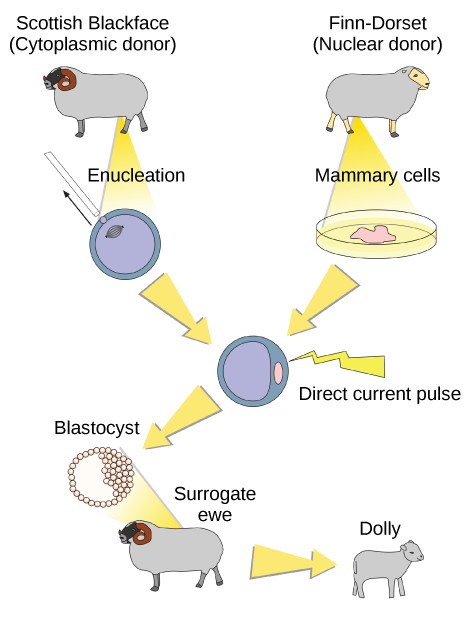
Cloning: Is it right? Would You Want to be Cloned?
Cloning is a term used to describe several processes that may be used to make genetically identical replicas of a biological creature. A clone is a replicated substance with the same composition as the original. Cloned organisms include DNA, cells, organs, and even whole animals such as sheep. The procedure involves inserting a gene from another creature into the genetic makeup of a vector. For instance, identical twins are formed when a fertilized egg splits, producing two or more embryos with almost every DNA. In 1997, scientists successfully cloned a sheep named Dolly (The Life of Dolly) to develop a new way of generating genetically modified species. This new technological breakthrough raised a fundamental issue for scientists: can people be cloned? These experts will now be able to use this technology for medications and treatment procedures. Are these technologies safe?

Therapeutic and reproductive cloning is the most well-known and hotly discussed kind of cloning. Therapeutic cloning is a method of creating stem cells, organs, and even complete organisms for transplantation through cloning (4). In other words, cloning is done for medical purposes. Reproductive cloning is the process of creating a human that is genetically identical to its source of DNA. Dolly, for example, was a live clone generated from 227 embryos through reproductive cloning. Researchers have discovered some negative health effects in cloned sheep and other animals. They include a rise in birth size and other factors affecting essential organs, including the liver, brain, and heart (2). Additional effects include accelerated aging and immune system issues. Its inefficiency, along with safety concerns, is a key problem in the application of reproductive cloning.
Cloning animals, on the other hand, may open the door to possible medicinal and agricultural advantages. Farmers can improve the quality of their crops or animals by cloning multiple copies of their finest animal or crop. That is quite advantageous because we humans seek to invest in the best crops for consumption. Another example is Dolly, our sheep, cloned by the same scientist. Dolly has produced more sheep whose milk contains a human protein necessary for blood coagulation. The idea is to extract this protein from milk and administer it to people whose blood does not clot properly. (1)

According to the New York Times story, “South Korean scientists claim to have cloned a human cell,” “creating a four-cell embryo that theoretically could have grown into a genetically identical replica of the woman” (3). Nevertheless, due to ethical concerns, they stopped the experiment after only four cells and did not take the vital step of implanting the source in a woman. With this information, we now know that human cloning is still possible. It has not been completed, but what if one day these scientists do not stop these procedures and call it “just for testing,” as they have done many times to people from various ethnic groups who have histories of racism, language, religion, cultural, or gender bias? What would occur? We witness it every day, exactly as in the story of Henrietta Lacks (5), a black lady affected by the healthcare system and the absence of treatment for people of different ethnic groups. Henrietta’s medical records were taken without her consent and used for cancer experimentation for years by a cell specialist. Several people researched these cells, and institutes all around the nation experimented with them. Henrietta died soon after her diagnosis, and her family was never informed about the trials. Unfortunately, her family did not receive any compensation, even though her cells were a breakthrough and many people made a huge amount of money from them.
Considering all of the positives and drawbacks, such as using cloning to obtain the best crops and resources and the curiosity of cloning human cells similarly to animal cells, people may be cloned, but for what purpose as well as using animals to produce medication, which some consider immoral because it can be done with humans, and in many situations, scientists do not seek consent to do this sort of study. Structural racism can come from any type of discrimination, like race, religion, language, etc. To address these issues and ensure that our personal information is not compromised, we must speak up and educate others who are unfamiliar with this information. It is a rapidly evolving situation, therefore, it is critical to be alert.
1.“The Life of Dolly | Dolly the Sheep.” The Life of Dolly | Dolly the Sheep,
The Life of Dolly | Dolly the Sheep
2.“Why We Still Haven’t Cloned Humans — It’s Not Just Ethics.” YouTube, 30 Dec. 2020, Why We Still Haven’t Cloned Humans — It’s Not Just Ethics
3.https://www.nytimes.com/1998/12/17/world/south-korean-scientists-say-they-cloned-a-human-cell.html
4.“What’s the Difference Between Cloning Embryonic Stem Cells and Cloning a New Organism? – Nature Reports Stem Cells.” Nature, 14 June 2007, doi:10.1038/stemcells.2007.21.
5. Khan, Faroque A. “The Immortal Life of Henrietta Lacks.” The Journal of IMA vol. 43,2 (2011): 93–94. doi:10.5915/43-2-8609


